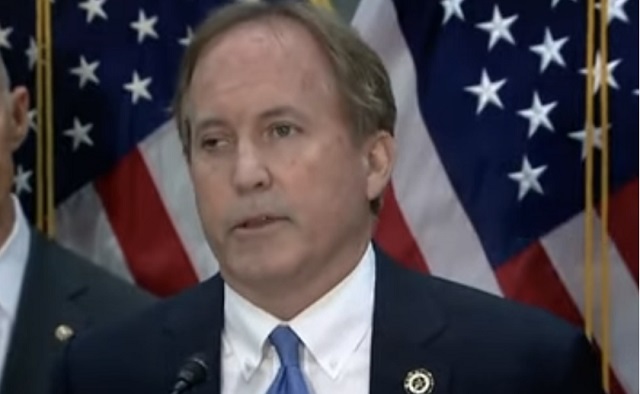International
Texas judges issue additional rulings blocking Title IX revisions

Texas Attorney General Ken Paxton
From The Center Square
Rule change blocked in 15 states
Two federal judges have ruled in favor of Texas and Texas plaintiffs in separate lawsuits filed to block a Biden administration Title IX rule change from going into effect.
Texas is now the 15th state where the revisions are blocked from going into effect ahead of an Aug. 1 deadline.
Judge Matthew Kacsmaryk of the U.S. District Court for the Northern District of Texas Amarillo Division on Friday granted the state’s request in a lawsuit filed by the state and two University of Texas at Austin professors. Kacsmaryk enjoined the U.S. Department of Education from “implementing, enacting, enforcing, or taking any action any manner to enforce” a new rule that revised Title IX pending the resolution of the case.
“The Final Rule inverts the text, history and tradition of Title IX: the statute protects women in spaces historically reserved to men; the Final Rule inserts men into spaces reserved to women,” Kacsmaryk said in his 32-page ruling.
In response, Texas Attorney General Ken Paxton, said, “Texas has successfully blocked Biden’s Department of Education from destroying Title IX protections for women and forcing radical ‘transgender’ ideology on Texas schools. Biden’s rule would have forced our schools to accommodate biological men on women’s sports teams and in female bathrooms, showers, and locker rooms, and required students and teachers to use incorrect pronouns. A federal judge has halted Biden’s rule pending a final ruling. It’s an honor to defend our State from Biden’s unlawful subversion of Title IX.”
Also on Friday, U.S. District Judge Reed O’Connor issued a preliminary injunction against the rule in favor of Carroll Independent School District. In May, the district’s board of trustees, represented by Alliance Defending Freedom, passed a resolution denouncing the Title IX changes and sued asking the court to block it from going into effect.
Also in May, Texas Gov. Greg Abbott instructed the Texas Education Agency and Texas colleges and universities not to comply with the changes, The Center Square reported. In the last two legislative sessions, Abbott signed bills into law to strengthen student safety and “protect the integrity of women’s sports by prohibiting men from competing against female athletes.” Abbott said, “I will not let President Biden erase the advancements Texas has made.”
Judge O’Connor said in his ruling, “The compliance costs also go beyond monetary harm given the potential to infringe on constitutional rights. Privileging gender identity over biological sex is in no way authorized by the statutory text. And the consequences based on this statutory distortion appear limitless. For these reasons, and those stated by other federal courts, Carroll ISD is likely to succeed on the merits of their challenge to the final rule.”
The rulings were issued after O’Connor in June vacated a guidance issued by the DOE and the Department of Justice requiring schools to implement similar policies to the rule change before it was finalized. He also issued a permanent injunction against its enforcement in Texas, The Center Square reported.
Texas sued in June 2023 over the agencies’ mandates; the agencies are responsible for administering and enforcing Title IX.
At issue is Title IX, part of the Education Amendments Act of 1972, which states, “No person in the United States shall, on the basis of sex, be excluded from participation in, be denied the benefits of, or be subjected to discrimination under any education program or activity receiving Federal financial assistance.”
The law was enacted at a time when women and girls had limited athletic opportunities. Despite widespread opposition, including from women’s groups, the Biden administration began amending Title IX through several methods, arguing doing so would “advance educational equity and opportunity for women and girls across the country.”
It’s guidances and rule changes redefine biological sex to include “sexual orientation” and “gender identity.”
In response, 18 AGs argued the changes “demolished” women’s and girls’ rights, “making a mockery of Title IX’s fundamental organization principle – basic biology.”
After the Biden administration finalized the rule, multiple states sued. Texas sued on its own. Louisiana, Mississippi, Montana and Idaho filed a lawsuit. Alaska, Kansas, Utah and Wyoming filed another. Indiana, Kentucky, Ohio, Tennessee, Virginia and West Virginia filed a separate lawsuit. Alabama, Florida, Georgia and South Carolina filed another.
So far, federal judges have ruled against the Biden administration.
In June, Louisiana, U.S. District Judge Terry Doughty was the first to rule against the administration, blocking the administration’s changes from going into effect in Louisiana, Mississippi, Montana and Idaho.
O’Connor also ruled against the agency Title IX mandates in June.
In Kansas, U.S. District Judge Danny Reeves blocked the rule change from going into effect in Indiana, Kentucky, Ohio, Tennessee, Virginia and West Virginia.
Then in July, in Kansas, District Judge John Broomes ruled against the administration, blocking the changes from going into effect in Alaska, Kansas, Utah and Wyoming. And Judge Kacsmaryk blocked the rule from going into effect in Texas.
Health
RFK Jr’s argument for studying efficacy of various vaccines

From HHS Secretary Robert F Kennedy’s Facebook Page
Censorship Industrial Complex
Pro-freedom group warns Liberal bill could secretly cut off Canadians’ internet access

From LifeSiteNews
“The minister could order this dissident’s internet and phone services be cut off and require that decision remain secret”
Free speech advocates have warned that the Liberals’ cybersecurity bill would allow them to block any individual’s internet access by secret order.
During an October 30 Public Safety committee meeting in the House of Commons, Canadian Constitution Foundation (CCF) counsel Josh Dehaas called for Liberals to rewrite Bill C-8, which would allow the government to secretly cut off Canadians access to the internet to mediate “any threat” to the telecommunications system.
“It is dangerous to civil liberties to allow the minister the power to cut off individual Canadians without proper due process and keep that secret,” Dehaas testified.
“Consider for example a protestor who the minister believes ‘may’ engage in a distributed denial of service attack, which is a common form of civil disobedience employed by political activists,” he warned.
“The minister could order this dissident’s internet and phone services be cut off and require that decision remain secret,” Dehaas continued, adding that the legislation does not require the government to obtain a warrant.
In response, Liberal MP Marianne Dandurand claimed that the legislation is aimed to protect the government form cyberattacks, not to limit freedom of speech. However, Dehaas pointed out that the vague phrasing of the legislation allows Liberals to censor Canadians to counter “any threat” to the telecommunications system.
Bill C-8, which is now in its second reading in the House of Commons, was introduced in June by Minister of Public Safety Gary Anandasangaree and contains a provision in which the federal government could stop “any specified person” from accessing the internet.
The federal government under Prime Minister Mark Carney claims that the bill is a way to stop “unprecedented cyber-threats.”
The bill, as written, claims that the government would need the power to cut someone off from the internet, as it could be “necessary to do so to secure the Canadian telecommunications system against any threat, including that of interference, manipulation, disruption, or degradation.”
Many Canadians, including Conservative MPs and freedom groups, have condemned the legislation, along with several other new Liberal bills which aim to censor internet content as well as go after people’s ability to speak their minds.
“Experts and civil society have warned that the legislation would confer ministerial powers that could be used to deliberately or inadvertently compromise the security of encryption standards within telecommunications networks that people, governments, and businesses across Canada rely upon, every day,” the Canadian Civil Liberties Association wrote in a recent press release.
Similarly, Canada’s own intelligence commissioner has warned that the bill, if passed as is, could potentially be unconstitutional, as it would allow for warrantless seizure of a person’s sensitive information.
-

 Business1 day ago
Business1 day agoTrans Mountain executive says it’s time to fix the system, expand access, and think like a nation builder
-

 International1 day ago
International1 day agoBiden’s Autopen Orders declared “null and void”
-

 MAiD1 day ago
MAiD1 day agoStudy promotes liver transplants from Canadian euthanasia victims
-

 Business1 day ago
Business1 day agoCanada has given $109 million to Communist China for ‘sustainable development’ since 2015
-

 Internet1 day ago
Internet1 day agoMusk launches Grokipedia to break Wikipedia’s information monopoly
-

 Business1 day ago
Business1 day agoCanada’s combative trade tactics are backfiring
-

 Automotive1 day ago
Automotive1 day agoCarney’s Budget Risks Another Costly EV Bet
-

 Business1 day ago
Business1 day agoYou Won’t Believe What Canada’s Embassy in Brazil Has Been Up To






